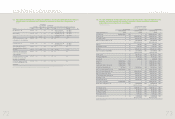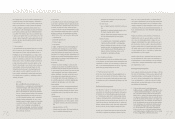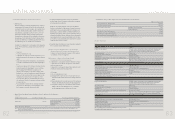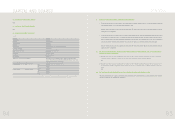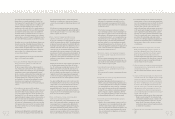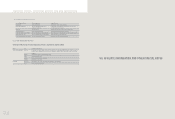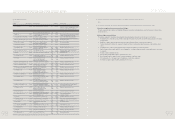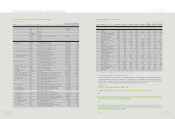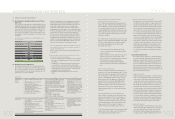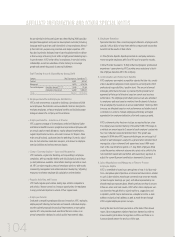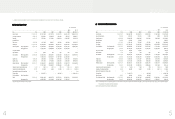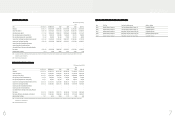HTC 2009 Annual Report Download - page 47
Download and view the complete annual report
Please find page 47 of the 2009 HTC annual report below. You can navigate through the pages in the report by either clicking on the pages listed below, or by using the keyword search tool below to find specific information within the annual report.
92 93
HTC earnings are denominated primarily in US dollars and euros.
Manufacturing costs are denominated primarily in US dollars. Thus,
forex fluctuations have the potential to impact HTC sales made in foreign
currencies, operating costs and operating income. In addition to strict
management of the quality and payment cycles of foreign currency-
denominated accounts receivable, HTC relies on forward exchange con-
tracts to minimize exchange risk. At the close of 2009, financial deriva-
tives held by HTC related to exchange risk were valued at EUR76 mil-
lion, with the fair value of such derivatives to take effect in response to
exchange rate changes. If the quoted exchange rate of one of the above-
mentioned currencies were to fall 1% against the NT dollar, the benefit to
HTC of its derivative holdings would be close to NT$34,575 thousands.
During 2009, the euro rose against the NT dollar from 1:46 at the begin-
ning of the year to a high of 1:48. It had settled back to 1:46 by year's
end. The US dollar began 2009 at 1:33 against the NT dollar. It rose dur-
ing 1Q to 1:35 before falling back steadily to 1:32. Exchange income
earned during 2009 totaled NT$531,782 thousands. As currently man-
aged, the negative effects of exchange rate fluctuations on profits in
recent years have been minimal.
Inflation in Taiwan during 2009 stood at -0.8%, and inflation-related
impacts on HTC's bottom line were negligible.
2. Risks associated with high-risk/high-leveraged investment;
lending, endorsements, guarantees for other parties and
financial derivative transactions:
HTC does not engage in high-risk ventures, highly leveraged invest-
ments or financial loans to other parties. HTC acts as a guarantor only to
subsidiary companies in which it holds 100% ownership. All such guar-
antor arrangements must be reviewed and approved by the board of
directors, in accordance with the document "Rules for Endorsements and
Guarantees". All HTC derivative product trading is done to mitigate risks
arising from fluctuations in the exchange value of foreign currency
assets and liabilities. All derivative products trading by the company
must adhere to relevant corporate policies and action measures
described in the document "Procedures for the Acquisition or Disposal
of Assets".
3. Future R&D plans and anticipated R&D expenditures:
The focus of recent R&D activities at HTC has been on user interface and
mobile internet related technologies and products as well as the provi-
sion of technical support and after sales service for HTC products. The
2009 launch of HTC Sense, HTC's proprietary user interface, marked a
major breakthrough for the company in enhancing the user experience. A
diverse suite of powerful functions bundled into a highly customized
user interface put extensive user personalization of their smart phones
within easy reach. Continued improvement of this interface has resulted
in the launch of an enhanced version of HTC Sense, an advanced smart
phone interface tailored to help users integrate and manage an array of
social networking services.
Extending beyond its Windows Mobile and Android OS product lines,
HTC recently launched a new product line built on Qualcomm's Brew
introduce new products in order to maximize HTC's position in the
global wireless telecommunications sector and deliver excellent
opportunities for growth. Active management of the HTC brand has
already significantly reduced the distance between the corporation and
its markets and customers.
HTC will continue to leverage assets and resources effectively to
secure new technologies and R&D results while instilling higher stan-
dards of quality for its products in order to realize a full range of com-
petitive advantages. HTC has maintained a consistently strong handle
on evolutionary change in all of its core technology. Apart from regu-
larly launching new touch screen mobile phone models, the corpora-
tion was the first maker in the world to launch an Android-based
mobile phone and the first ever to launch a Windows-based mobile
phone paired with capacitive (touch screen) technologies. HTC will
continue to develop products incorporating the latest application tech-
nologies to satisfy and stimulate market demand as well as earn the
trust and respect of partners and investors.
6. Effect on the company's crisis management of changes in
the company's corporate image, and measures to be taken
in response:
HTC strives to maintain a high standard of professional ethics and
business operations management. HTC is governed by a code of cor-
porate integrity and ethical standards and its management team toler-
ates no unethical acts or lapses in integrity.
7. Expected benefits and possible risks associated with any
merger and acquisitions, and mitigation measures being or
to be taken:
HTC has no new acquisition plans as of the printing date of this annu-
al report.
8. Anticipated benefits and risks posed by HTC plant expansion
work, and response measures:
Responding to global market demand for smart phone devices, in
addition to continuously reviewing and improving production process-
es to enhance capacity, quality and cost savings, HTC in 2009 invest-
ed in expanding its production facilities at Kangqiao, near Shanghai,
China in order to both expand capacity and enhance manufacturing
flexibility. HTC has also carefully selected a number of outsourcing
partners to help produce components and products for orders that
HTC's current capacity would otherwise be unable to fill. This practice
has infused additional flexibility into HTC's production capacity.
9. Concentration risks associated with purchases and sales,
and response measures:
a. Purchases: The technology of materials / components suppliers in
the mobile phone sector is increasingly mature and stable, giving
HTC the potential for alternative suppliers when designing new
products and avoiding risks associated with sourcing from one sup-
plier. Also, HTC engages in volume purchasing to reduce unit pur-
chase costs and achieve the most advantageous cost structure pos-
sible for the company.
Mobile Platform. Brew MP emphasizes streamlined simplicity at an
affordable price in a strategic move to greatly increase the number of
consumers choosing to upgrade from traditional mobile phones to smart
phones.
HTC will continue to enhancing the user experience and developing
smart phones operating on Windows Mobile, Android and Brew MP sys-
tems. HTC anticipates investing 5%~7% of revenues in R&D in order to
sustain its competitive edge in this area.
4. Effects of domestic / foreign government policies and
regulations on HTC finances, and response measures:
In response to recent changes in accounting regulations, as of 1 January
2008, HTC has adopted Interpretation 96-052 - "Accounting for Bonuses
to Employees, Directors and Supervisors" issued in March 2007 by the
Accounting Research and Development Foundation with respect to rec-
ognizing as compensation expenses bonuses paid to employees and
remuneration to directors and supervisors rather than as appropriations
from earnings. Ahead of government requirements, HTC has also imple-
mented revisions to Statement of Financial Accounting Standards No. 10
related to how accounts are managed with regard to inventory. Note 3 to
the 2009 financial reports provides a detailed description of the reasons
underlying recent accounting practice changes and their impact upon
financial reporting.
Based on government plans, the Statute for Upgrading expired at the end
of 2009. Detailed support measures have yet to pass the Legislative
Yuan. HTC currently enjoys benefit primarily in terms of tax credits for
R&D investment and a five-year tax break. Once tax breaks come to
term, any assessment of the impact of such on profitability will need to
take into consideration how relevant laws have been revised. Also, with
regard to the five-year tax break, approved applicants may apply and
receive benefits even prior to formal implementation of incentive meas-
ures and still enjoy benefits for the entire designated five-year period.
In accordance with May 2009 revisions to Article 5 of the Income Tax
Act, beginning in 2010, the income tax rate assessed on profit-seeking
enterprises will be reset to 20% from the previous 25%. However, as
HTC already enjoys alternative minimum tax benefits, this revision
downward in the general tax is not expected to have a significant effect
on HTC income tax burdens over the short term. HTC will continue to
stay apprised of the latest relevant information and take measures appro-
priate to the needs of HTC business operations.
5. Effects on HTC finances of changes in technology and the
business sector, and response measures:
Wireless telecommunications is today a mainstream trend in the devel-
opment of the IT industry and technologies. Smart phones are now the
keystone product in wireless telecommunications. With demand for
mobile internet taking off and platforms gradually ratcheting up to 3G,
HTC adjusts its product R&D work and alters its business to reflect
changing trends. Such can only further benefit development and refine-
ment of core technologies and products at HTC. Concurrent efforts are
made to join with international telecommunications service providers to
b. Sales: Markets for HTC products are distributed across Europe, the
Americas and Asia. Local telecom service providers and retailer part-
ners are the two principal sales channels used by HTC. The imminent
arrival of 3G to the mainstream of mobile telecommunications is
expected to enhance steadily the influence of telecom service
providers in the mobile phone market, which can be expected to ben-
efit HTC products significantly. Apart from working with current cus-
tomers to expand markets and strengthening strategic cooperative
partnerships, HTC regularly communicates with the world's leading
IT and telecom companies with regard to cooperative projects. Such
also facilitates HTC's understanding of and insight into market
trends. Also, HTC is developing and promoting the proprietary HTC
brand as well as strengthening supervision of and working relation-
ships with channel retailers in order to reduce business and sales
concentration risks.
10. Effect upon and risk to the company in the event a major
quantity of shares belonging to a director, supervisor, or
shareholder holding greater than a 10 percent stake in the
company has been transferred or has otherwise changed
hands, and mitigation measures being or to be taken:
As of the printing date of this annual report, no transfer or change of
hands of a significant portion of HTC share rights has occurred with
respect to any director, supervisor, or major shareholder holding
more than a 10 percent stake in the company.
11. Effect upon and risk to company associated with any change
in governance personnel or top management, and mitigation
measures being or to be taken:
There was no change in HTC managerial control in the 2009 fiscal
year.
12. Lawsuits and other legal proceedings. This category should
include all lawsuits and other non-litigation legal proceedings
related to the corporation; its directors, supervisors, presi-
dent, senior executives; major shareholders owning greater
than 10% of outstanding shares; and corporate subsidiaries,
the results of which could significantly affect shareholder
rights and / or share prices. Statements should be provided
with regard to the issue(s) under dispute, the value of the
object of litigation, date of lawsuit submission, principals
involved and developments in the legal matter as of the print-
ing date of this annual report.
(1)
Major lawsuits, non-litigious legal proceedings or administrative
litigations currently involving HTC, the results of which could
significantly affect shareholder rights and / or share prices: None
(2)
HTC has made appropriate financial provisions for all general
lawsuits subject to court hearings in which the corporation is
currently involved. None pose a threat of impacting significantly
on corporate finances or operations.
13. Other important risks and mitigation measures being or to be
taken:
None
FINANCIAL STATUS, OPERATING RESULTS AND RISK MANAGEMEN


